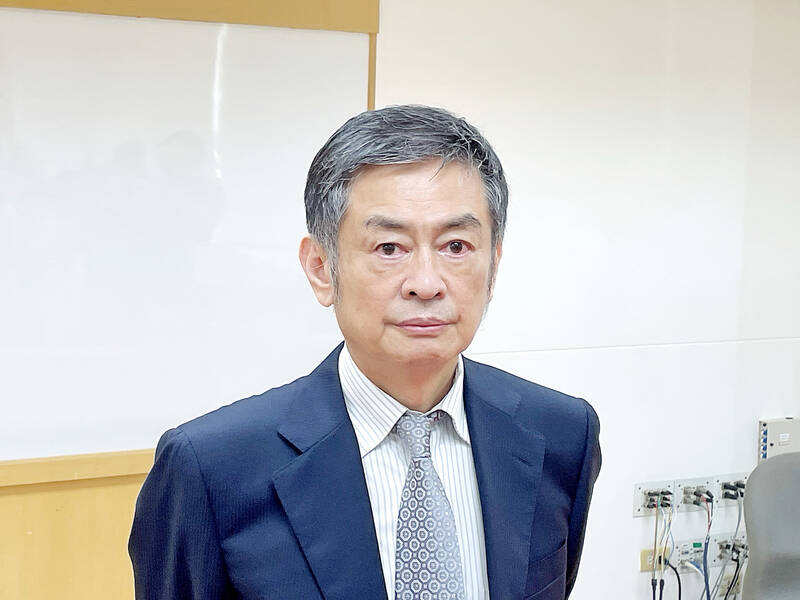Largan Precision Co (大立光) yesterday reported that its net profit last quarter hit the highest in eight quarters, driven by strong demand for smartphone camera lenses and gross margin improvement, but the company offered a cautious outlook for this quarter.
The nation’s largest handset camera lens maker said that net profit for the third quarter rose 11.4 percent year-on-year and surged 47.4 percent quarter-on-quarter to NT$6.63 billion (US$206.1 million).
That translated into earnings per share of NT$49.67, topping the NT$44.44 consensus estimate from a Yahoo Finance poll of analysts and marking the highest level in two years.

Photo: Ou Yu-hsiang, Taipei Times
Largan’s third-quarter revenue was also a record for the same period, rising 39.04 percent year-on-year to NT$18.95 billion last quarter as the company benefited from the intensive pull-in of camera components for Apple Inc's iPhone 16 series.
Largan and local rival Genius Electronic Optical Co (玉晶光) are two of Apple’s largest camera lens suppliers.
The company’s gross margin reached 50.22 percent last quarter, up from 42.56 percent a year earlier, it said.
Lenses with a resolution of 20 megapixels or more — a higher-margin product and one of Largan’s specialties — accounted for 10 to 20 percent of the company’s sales last quarter, and those of 10 to 20 megapixels made up 60 to 70 percent of sales, while 8 to 10 megapixel lenses comprised about 10 percent. Other products such as voice coil motors constituted 20 to 30 percent of sales, the company said.
During the first three quarters of this year, Largan’s net profit increased 31.96 percent to NT$17.24 billion from NT$12.94 billion in the same period last year, with earnings per share rising to NT$129.16 from NT$96.93, while revenue expanded 33.23 percent to NT$41.25 billion and gross margin increased 3.09 percentage points to 49.45 percent, it said.
The strong results came after market research firm International Data Corp on Monday reported that despite macroeconomic concerns, global smartphone shipments last quarter increased 4 percent year-on-year to 316.1 million units, the fifth consecutive quarter of growth.
Meanwhile, another research firm Canalys in its calculations, also released on Monday, pegged the increase for the same period at 5 percent, attributing the growth to ongoing replacement demand.
As the world economy does not fare well and concerns about iPhone 16 sales are rising, the company’s revenue for this month would be flat from last month, and next month’s revenue would be lower than this month, Largan chief executive officer Adam Lin (林恩平) told an online investors’ conference, without offering exact figures.
“Demand in the fourth quarter does not look good. It will be much worse than the third quarter,” Lin said, citing order cuts by customers and the entry of new competitors.
However, the factory utilization rate in the fourth quarter is expected to be similar to that in the third quarter, he said, mainly given the company will be producing confirmed next year's orders ahead of schedule.
Lin said the company’s manufacturing facilities in Taichung are fully loaded and a larger plant would be completed in September next year for smartphone camera lens production.

Intel Corp chief executive officer Lip-Bu Tan (陳立武) is expected to meet with Taiwanese suppliers next month in conjunction with the opening of the Computex Taipei trade show, supply chain sources said on Monday. The visit, the first for Tan to Taiwan since assuming his new post last month, would be aimed at enhancing Intel’s ties with suppliers in Taiwan as he attempts to help turn around the struggling US chipmaker, the sources said. Tan is to hold a banquet to celebrate Intel’s 40-year presence in Taiwan before Computex opens on May 20 and invite dozens of Taiwanese suppliers to exchange views

Application-specific integrated circuit designer Faraday Technology Corp (智原) yesterday said that although revenue this quarter would decline 30 percent from last quarter, it retained its full-year forecast of revenue growth of 100 percent. The company attributed the quarterly drop to a slowdown in customers’ production of chips using Faraday’s advanced packaging technology. The company is still confident about its revenue growth this year, given its strong “design-win” — or the projects it won to help customers design their chips, Faraday president Steve Wang (王國雍) told an online earnings conference. “The design-win this year is better than we expected. We believe we will win

Chizuko Kimura has become the first female sushi chef in the world to win a Michelin star, fulfilling a promise she made to her dying husband to continue his legacy. The 54-year-old Japanese chef regained the Michelin star her late husband, Shunei Kimura, won three years ago for their Sushi Shunei restaurant in Paris. For Shunei Kimura, the star was a dream come true. However, the joy was short-lived. He died from cancer just three months later in June 2022. He was 65. The following year, the restaurant in the heart of Montmartre lost its star rating. Chizuko Kimura insisted that the new star is still down

While China’s leaders use their economic and political might to fight US President Donald Trump’s trade war “to the end,” its army of social media soldiers are embarking on a more humorous campaign online. Trump’s tariff blitz has seen Washington and Beijing impose eye-watering duties on imports from the other, fanning a standoff between the economic superpowers that has sparked global recession fears and sent markets into a tailspin. Trump says his policy is a response to years of being “ripped off” by other countries and aims to bring manufacturing to the US, forcing companies to employ US workers. However, China’s online warriors